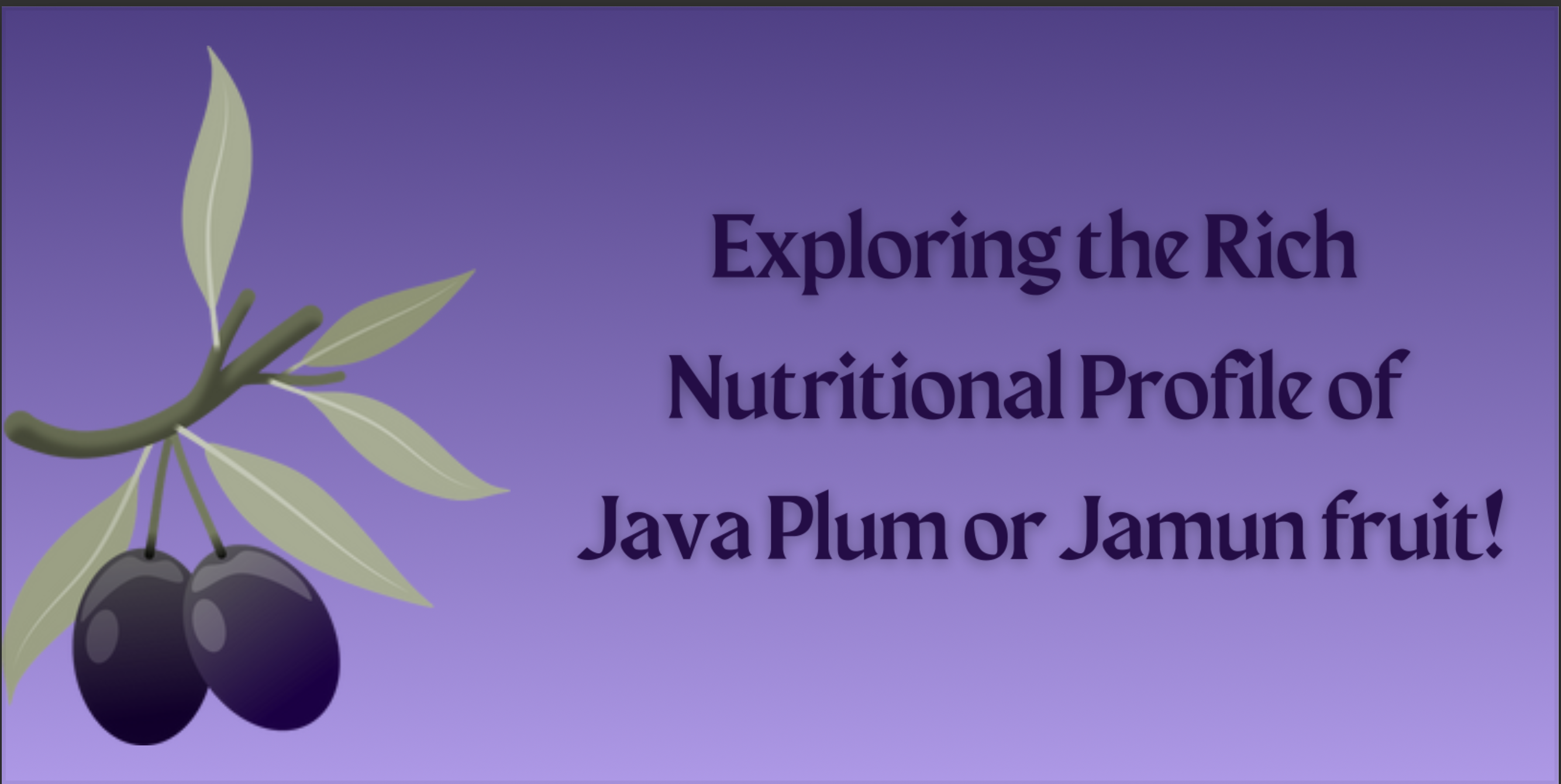
Exploring the Rich Nutritional Profile of Java Plum or Jamun fruit
When it comes to a healthy diet, it’s important to explore a variety of foods that offer significant health benefits. Java Plum, also known as Jamun fruit, is one such food that deserves attention. This small, sweet fruit is packed with a range of nutrients that can help support overall health and well-being.
The nutritional value of Java Plum is impressive, and its health benefits have been recognized for centuries in traditional medicine practices. In this blog, we’ll delve deeper into the health benefits of Jamun fruit and explore the nutritional profile of Java Plum to help you understand why this fruit is a must-try for anyone seeking a healthier lifestyle.
Nutritional Profile of Java Plum or Jamun fruit
The nutritional profile of Java Plum or Jamun fruit is quite impressive. This fruit is a great addition to a balanced diet because it is low in calories and rich in necessary elements. In terms of macronutrients, Java Plum or Jamun fruit contains a significant amount of carbohydrates and fibre. This fibre content can help promote healthy digestion and lower cholesterol levels in the body.
In addition to carbohydrates and fibre, Java Plum or Jamun fruit contains a range of essential micronutrients. These include vitamins such as vitamin C, vitamin A, and vitamin B6. It also contains minerals such as calcium, iron, and potassium.
When compared to other fruits, Java Plum or Jamun fruit stands out for its high antioxidant content. Antioxidants are essential for maintaining optimal health by protecting cells from damage caused by free radicals.
Health Benefits of Java Plum or Jamun fruit
The health benefits of Jamun fruit or Java Plum are numerous and varied. One of the most notable benefits is its anti-inflammatory properties. The presence of phytochemicals such as flavonoids and polyphenols in Java Plum or Jamun fruit can help reduce inflammation in the body and may aid in the prevention of chronic illnesses like heart disease and cancer.
Another significant health benefit of Java Plum or Jamun fruit is its ability to regulate blood sugar levels. It contains a compound called Jamboline, which can help lower blood sugar levels by increasing insulin sensitivity in the body. This makes it an ideal food for people with diabetes or those at risk of developing the condition.
In addition to its anti-inflammatory and blood sugar-regulating properties, Java Plum or Jamun fruit supports gut health. Its high fibre content helps promote healthy digestion and can alleviate constipation and other digestive issues.
Culinary Uses of Java Plum or Jamun fruit
Java Plum or Jamun fruit is not just a nutritious and healthy fruit, but it is also a versatile ingredient used in various culinary dishes and beverages. In many parts of the world, this fruit is also used in traditional medicine.
Some popular dishes made from Java Plum or Jamun fruit include jams, jellies, chutneys, pickles, and desserts such as pies and ice creams. The fruit is also used to make refreshing beverages like juices, shakes, and sherbets.
In traditional medicine, Jamun fruit is used to treat several ailments such as diarrhoea, dysentery, and stomach disorders. The fruit’s seeds and bark have potent medicinal properties that make them useful in treating diabetes, heart diseases, and other ailments.
There are also innovative recipes incorporating Java Plum or Jamun fruit, such as Jamun fruit salad with feta cheese, Jamun fruit pizza, and Jamun fruit smoothie bowls. The fruit’s tangy and sweet flavour makes it an exciting addition to any dish, adding a unique and delicious twist while reaping the health benefits of Jamun fruit and the nutritional value of Java Plum.
Growing and Harvesting Java Plum or Jamun fruit
Growing and harvesting Java Plum or Jamun fruit are essential aspects of its production. The nutritional value of Java Plum or Jamun fruit depends on the growing conditions, harvesting techniques, and storage.
Java Plum or Jamun fruit thrives in warm and tropical climates and grows well in well-drained loamy soils. Please click here to know about “Soil and Organic Farming.” The fruit trees are drought-resistant and can tolerate slight frost. Java Plum or Jamun fruit is available seasonally, and the peak season is from May to July.
It is important to pick the fruit at the right maturity level to ensure optimal taste and nutritional value. After harvesting, the fruit should be stored in a cool and dry place to prevent spoilage. Proper harvesting and storage techniques are crucial to ensure the maximum nutritional benefits of Java Plum or Jamun fruit.
Conclusion
In conclusion, we must recognize the nutritional value and health benefits of Jamun fruit or Java Plum. It is packed with essential macro and micro-nutrients, making it a valuable addition to any diet. Besides, its anti-inflammatory properties, ability to regulate blood sugar levels and digestive benefits make it an excellent choice for maintaining good health.
The culinary uses of Jamun fruit or Java Plum are diverse, with a range of traditional and innovative recipes. Incorporating this fruit into our daily meals can provide various health benefits, including better gut health and disease prevention. As research in the field of nutrition continues to grow, it will be interesting to see how Jamun fruit or Java Plum can be used to enhance overall health and well-being.